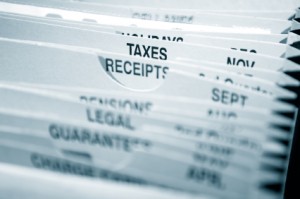 For many taxpayers, it can be difficult to determine when it is safe to eliminate old records. From utility bills and credit card statements to trade confirmations and tax returns, it can be hard to let go of these items. Instead of a well-organized filing system, many people end up with something that more closely resembles the financial equivalent of the television show "Hoarders." However, understanding the purpose for retaining records can help you understand when it is safe to shred them.
For many taxpayers, it can be difficult to determine when it is safe to eliminate old records. From utility bills and credit card statements to trade confirmations and tax returns, it can be hard to let go of these items. Instead of a well-organized filing system, many people end up with something that more closely resembles the financial equivalent of the television show "Hoarders." However, understanding the purpose for retaining records can help you understand when it is safe to shred them.
Generally, records are needed to verify and eliminate discrepancies that may come up related to financial matters -- particularly taxes. The length of time that you may want to consider keeping a document depends on the event the document supports or records.
According to the Internal Revenue Service, you must keep records that support an item of income or deductions on a tax return until the period of limitations for that return runs out. The period of limitations is the period of time in which you can amend your tax return to claim a credit or refund, or that the IRS can assess additional tax. While the period of limitations is three years if all of the income was reported correctly on your return, consider keeping your records for at least seven years if you failed to report income that is more than 25 percent of the gross income shown on your return.
In a case where a taxpayer failed to file a return, or where fraud may have existed, records should be kept indefinitely, since there is no period of limitations in that case. For this reason, it is generally a good idea to keep tax returns indefinitely so that you can provide evidence of the accuracy of your returns if they ever come into question. Also, consider keeping birth and death certificates, marriage and divorce papers, deeds, military records, wills and estate planning documents and life insurance policies indefinitely.
Supporting documentation related to proof of income and expenses should be maintained for a minimum of seven years. Forms including W2s, 1099s, the K1 documents that partnerships report, invoices, receipts, canceled checks, medical expenses that were deducted, and proof of payment should be carefully organized. You may even want to consider saving W2s until you begin receiving Social Security benefits so that you can verify that you have received proper credit.
What about records of stocks, bonds, or other investments? If you have records related to the acquisition or disposition of assets, you may also want to consider maintaining detailed records for seven years from the date of sale. Brokerage trade confirmations should show the purchase price, sale price and any commissions. In addition, keep records on reinvested dividends or stock splits. For real estate sales, maintain records of the purchase price, the sale price, insurance records, proof of payments and any major home improvements. See IRS publication 552 for more information.
What can be tossed?
Nondeductible monthly bills such as utility, cable and phone bills can be thrown away after you review them for accuracy and confirm payment. ATM receipts and bank receipts can be shredded after you reconcile them against your bank records, and paystubs can be destroyed after you reconcile them against your W2. While you should save trade confirmations from brokerage accounts as noted above, you can shred monthly brokerage statements after you receive your year-end statement.
Once you have determined which documents are expendable, be sure to shred them before they make their way into the trash so that you can reduce the chances of identity theft.
Eliminating unnecessary clutter and maintaining organized financial records can prove beneficial over the long run.
Since everyone's situation is unique, speak to your tax and legal advisers to determine which records are critical to your situation.
Kurt J. Rossi, MBA, is a certified financial planner practitioner. He can be reached for questions at (732) 280-7550 and kurt.rossi@Independentwm.com. LPL Financial Member FINRA/SIPC.








